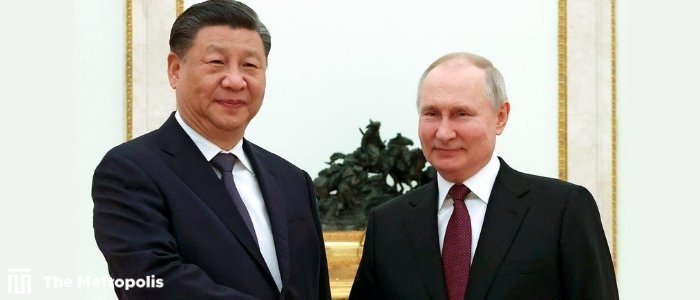Photo: AP-
Metropolis Desk-
China has expressed its support for Russia after a brief uprising posed the biggest threat to Vladimir Putin’s 23-year rule. Putin has been a strong ally of Chinese leader Xi Jinping in his efforts to usher in a new global order and a strategic alliance against the United States.
The Wagner mercenary group’s brief mutiny caused reverberations outside of Russia, including in neighboring China, where Xi and Putin have developed a close relationship over their shared mistrust of the West. This strategic alliance has grown stronger in recent years, despite Moscow’s bumbling invasion of Ukraine.
According to Chong Ja Ian, an associate professor of political science at the National University of Singapore, “There’s probably some scrambling around in Beijing to figure out what this means for Putin going forward, especially if it means a more fractured Russia or a Putin who is very much weakened.”
Late Sunday night, Beijing finally made a statement in support of Russia, dismissing the incident as “Russia’s internal affair.”
According to a statement posted online by the Chinese Foreign Ministry, “China supports Russia in maintaining national stability and achieving development and prosperity as its friendly neighbor and comprehensive strategic partner of coordination for the new era.”
Beijing’s thoughtful public statement came after the brief and disorderly uprising had subsided, with warlord Yevgeny Prigozhin allegedly agreeing to withdraw his fighters on Saturday as part of an agreement with the Kremlin that would see him go into exile in Belarus.
It also happened after Chinese officials met with Russian Deputy Foreign Minister Andrey Rudenko in Beijing on Sunday, where the two nations reaffirmed their strong political ties and partnership.
China’s Foreign Minister Qin Gang and Rudenko discussed “Sino-Russian relations and international and regional issues of common concern,” according to a one-line statement on the Chinese Foreign Ministry’s website that included a picture of the two smiling and walking side by side at the previously unannounced meeting.
In addition, Rudenko reportedly had “scheduled consultations” with China’s Deputy Foreign Minister Ma Zhaoxu, according to the Russian Foreign Ministry.
In response to the events of June 24, the Chinese side “expressed support for the efforts of the leadership of the Russian Federation to stabilize the situation in the country and reaffirmed its interest in strengthening the unity and further prosperity of Russia,” according to a statement from the Russian ministry.
Ma reportedly told Rudenko that under the direction of Xi and Putin, political trust and cooperation between China and Russia had steadily increased. Additionally, Ma vowed to protect the “common interests” of the two nations in the face of a “complex and grim international situation.”
Since taking office in 2012, Xi, China’s most autocratic and powerful leader in decades, has personally met Putin 40 times, considerably more often than any other world leader.
The two most powerful autocrats in the world have been bringing their nations closer together recently to fight what they perceive to be an aging globe caused by “American hegemony.”
In February 2022, just before Putin started his war on Ukraine, the two made a “no limits” declaration of friendship. Since then, China has refrained from denouncing the invasion and instead supported Russia diplomatically and economically, a stance that has further strained relations with Western countries, particularly in Europe.
But as the destructive battle dragged on, Beijing’s expensive alliance was made worse by worries that the long struggle may eventually undermine Putin’s hold on power.
Wagner’s insurrection’s unprecedented display of resistance, which tore apart the façade of total authority Putin has fought to maintain more than 16 months into the invasion, has done more than anything to highlight those anxieties.
For the time being, a civil war in Russia appears to have been avoided, which Beijing will welcome with a sigh of relief.
In addition to endangering the security of its 4,300-kilometer (2,672-mile) border with China, internal strife in Russia also reduces Moscow’s value as a partner in Beijing’s efforts to counter the US. Worse yet, it may result in the emergence of a new government that is less favorable to China and more open to the West.
Beijing is undoubtedly concerned about Putin’s waning power, according to Wen-Ti Sung, a political scientist with the Taiwan Studies Program at the Australian National University.
According to him, China is likely afraid of a “domino effect” in which China could fall after Russia. Putinist Russia serves as a beneficial geopolitical and ideological buffer for China, particularly in the context of the Biden administration’s discourse on “value-based alignment.”
Source- CNN



